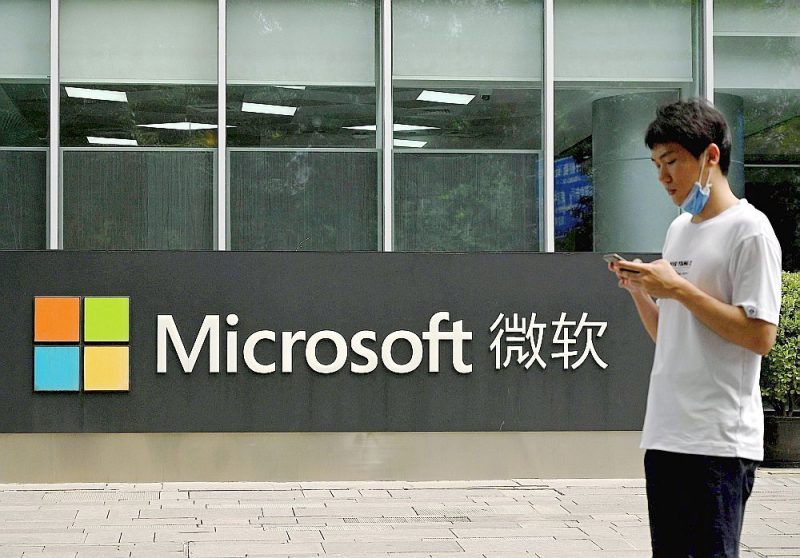
Western countries have opposed the Chinese government-backed cyber-espionage practice with unprecedented unity. Scene at Microsoft’s Beijing office.
Photo: Noel Celis / AFP / Scanpix / LETA
Viesturs Sprūde, “Latvijas Avīze”, JSC “Latvijas Mediji”
The United States, the European Union, Britain, and NATO also accused China at the beginning of the week of a large-scale cyber-attack on Microsoft Exchange e-mail servers around the world, as well as systematic other attacks on computer systems.
Canada, Australia, New Zealand and Japan have joined the charges.
–
The news
“In the full sense of the word, the minds of the nation are being bombed!” Egils Līcītis columnet
1 day
–
The news
Kalnins: “Catastrophic! The average Latvian is getting poorer, but the government is not taking responsibility! ”
1 day
–
The news
Categorically against vaccination and ready to quit. Why don’t teachers want to be vaccinated?
15 hours
–
Microsoft itself announced the hacking of e-mail servers in March. Hackers could potentially gain access to the company’s more than 250,000 servers worldwide through vulnerabilities in the email security system.
It is estimated that at least 30 thousand institutions have suffered from data theft – mostly private companies and research institutions related to important industries.
Through the back door
When criminals broke into the servers running the computer system, they installed so-called web shells that provide access to the server’s content. It is estimated that this happened already in January this year.
Hackers were then able to enter the system freely “back door” as needed, following, for example, customer correspondence, spying on them or extortion.
Already in the spring, immediately after closing the leak, Microsoft blamed the Chinese hacking group Hafnium, but the Chinese authorities denied their commitment and a high-level state response was lacking.
True, the U.S. Department of Justice has prosecuted three Chinese National Security Service personnel as well as one service-related hacker accused of systematic attacks on government agencies and companies in more than a dozen countries.
U.S. Secretary of State Anthony Blinken has already directly accused the Chinese Ministry of Homeland Security of making a cyber-escalation in a statement on Monday, July 19.
Mr Blinken emphasized that Beijing was pursuing a “pattern of irresponsible behavior in cyberspace” that threatened other countries’ economies and security. A “criminal ecosystem of hackers has been created, in which they operate in both state-sponsored activities and cybercrime for their own financial gain”.
It is also about theft of intellectual property. For example, Chinese cybercriminals have tried to steal a US-made vaccine formula to fight the Ebola virus.
Referring to anonymous sources in the US administration, Western media report that Chinese security services hire criminal cyber groups that otherwise deal with the so-called cyber racket for special tasks, that is, gain control of rich companies’ computer networks, paralyze them and unlock them for millions of dollars. receipt.
A statement issued by EU Foreign Minister Joseph Borrell, in line with the US message, said the attack came from Chinese territory but, contrary to the US position, did not directly blame Chinese state structures.
The EU acknowledges that the Microsoft Exchange hack has also affected some institutions in the EU and several Member States.
In addition, the cyber-attack has left a “hole” in the system that other hackers have tried to exploit: “Irresponsible and harmful actions have led to risks and major material damage to both our public authorities and private companies.”
The EU calls on China to abide by international norms and to fight cyber attacks from its territory.
The hacking attack on Microsoft Exchange, backed by the Chinese authorities, is irresponsible but familiar behavior. The Chinese government must put an end to these systematic computer versions. If this is not done, it will have to take responsibility for its actions, “warned the British Foreign Secretary Dominik Rabs.
In the UK alone, the Microsoft Exchange attack has caused problems for around 70 different organizations and institutions.
It is alleged that large amounts of both personal data and intellectual property could have been stolen during this operation.
Alarm signal
Although some allegations of cyber-attacks against China and Russia have been made in the past, BBC viewers point out that, for the first time, the warning has been on such a united front.
This shows that the hacking of the Microsoft Exchange is the largest attack of its kind to date, and the Western world has taken the threat very seriously.
US President Joe Biden and Secretary of State Blinken did not hide this week that China’s actions pose a “major threat to our economy and national security.”
According to Western special services, the case of Microsoft Exchange could be a signal of a change in China’s phishing tactics – in the past there were some targeted attacks to obtain specific information, but now it looks like an invasion of everything from server networks in the long run.
In addition, a “hole” in the security system has been created by the highly qualified group of hackers “Hafnium”, but other “APT 40” and “APT 31” related to the Chinese security services have already been involved in extracting information.
So far, there have been no signals that the West could punish China with any economic sanctions.
Analysts explain this on the assumption that they have been spared, as China could be more susceptible to such serious warnings than Russia in such cases.
Themes
–


